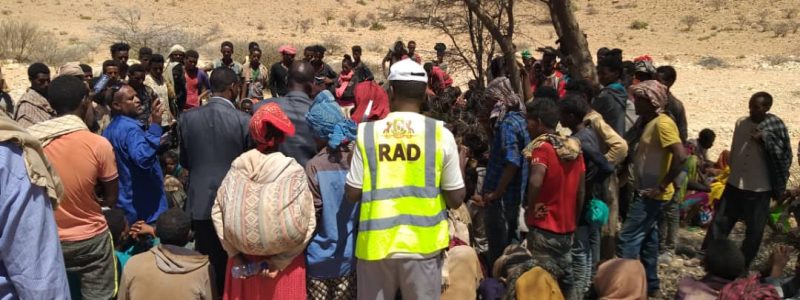As part of its ongoing commitment to promoting safe migration practices and protecting vulnerable migrant populations, Bareedo Platform Somalia has developed and produced a comprehensive set of Information, Education, and Communication (IEC) materials aimed at raising public awareness about the risks associated with irregular migration.
These materials are specifically designed to support the work of government agencies, humanitarian organizations, civil society actors, and frontline migration response teams engaged in mixed migration management and community outreach. They serve as valuable tools for educational campaigns, community dialogues, and information sessions at migrant entry/exit points, transit hubs, refugee reception centers, and host communities.
Languages and Accessibility
To ensure maximum reach and inclusivity, the materials are available in Amharic, Somali, and English—the most widely spoken languages among migrant populations in Puntland and the Horn of Africa region. Each material has been carefully designed to be:
- Culturally appropriate and context-sensitive
- Gender-sensitive, reflecting the distinct risks faced by women, girls, and other vulnerable groups
- Visually engaging and easy to understand, even for low-literacy audiences
- Suitable for use in both urban and rural settings, including community-based education and field-level interventions
Materials Produced
The IEC package includes a range of print-ready and visual-based content, such as:
- Posters on the dangers of human trafficking and smuggling
- Flyers outlining safe migration steps and rights-based information
- Illustrated leaflets with emergency contact and referral information
- Flip charts and infographics for community facilitators
- Awareness cards for border and transit points
These materials are open-source and free to download, print, and distribute. Bareedo Platform encourages all individuals, organizations, and agencies working in migration governance, humanitarian aid, or community development to use and adapt the materials in their own awareness-raising and advocacy efforts.
Download the Awareness-Raising Materials Below:
Message 1

ENGLISH
“Don’t Risk Your Life on False Promises. Irregular Migration Can Lead to Trafficking, Exploitation, and Death.”
Know the dangers. Always seek safe and legal pathways before deciding to migrate.

AMHARIC
“የሐሰት ተስፋዎች ላይ ህይወትህን አታስጋልጥ. ያልተመዘገበ ምልጃ ወደ እንደ ባህር ንብረት መሸጥ, ተገባበርነት, እና ሞት ሊወስድህ ይችላል.”
አደጋውን ያውቅ. መሄድ ከመወሰንዎ በፊት ደህናና ሕጋዊ መንገዶችን ፈልጉ

SOMALI
“Haku Halagin Naftaada Ballan Been ah. Tahriibka Sharci-darrada ah wuxuu kuu horseedi karaa khataraha ka ganacsiga dadka, tacaddi, iyo dhimasho.”
Ogow khataraha. Had iyo jeer raadi waddooyin ammaan ah oo sharci ah ka hor intaadan go’aansan inaad tahriibto.
Message 2

ENGLISH
“Human Smugglers Are Not Helpers—They Profit from Your Suffering.”
Irregular routes often lead to abuse, abandonment, or detention. Avoid smugglers and get accurate information from trusted sources.
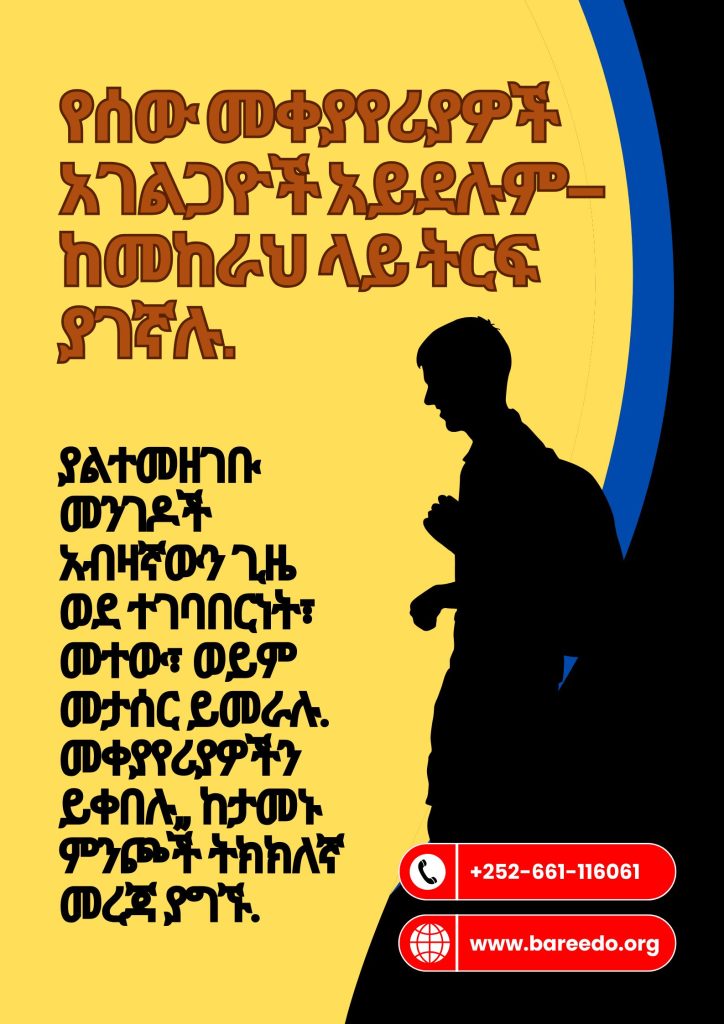
AMHARIC
“የሰው መቀያየሪያዎች አገልጋዮች አይደሉም—ከመከራህ ላይ ትርፍ ያገኛሉ.”
ያልተመዘገቡ መንገዶች አብዛኛውን ጊዜ ወደ ተገባበርነት, መተው, ወይም መታሰር ይመራሉ. መቀያየሪያዎችን ይቀበሉ, ከታመኑ ምንጮች ትክክለኛ መረጃ ያግኙ.
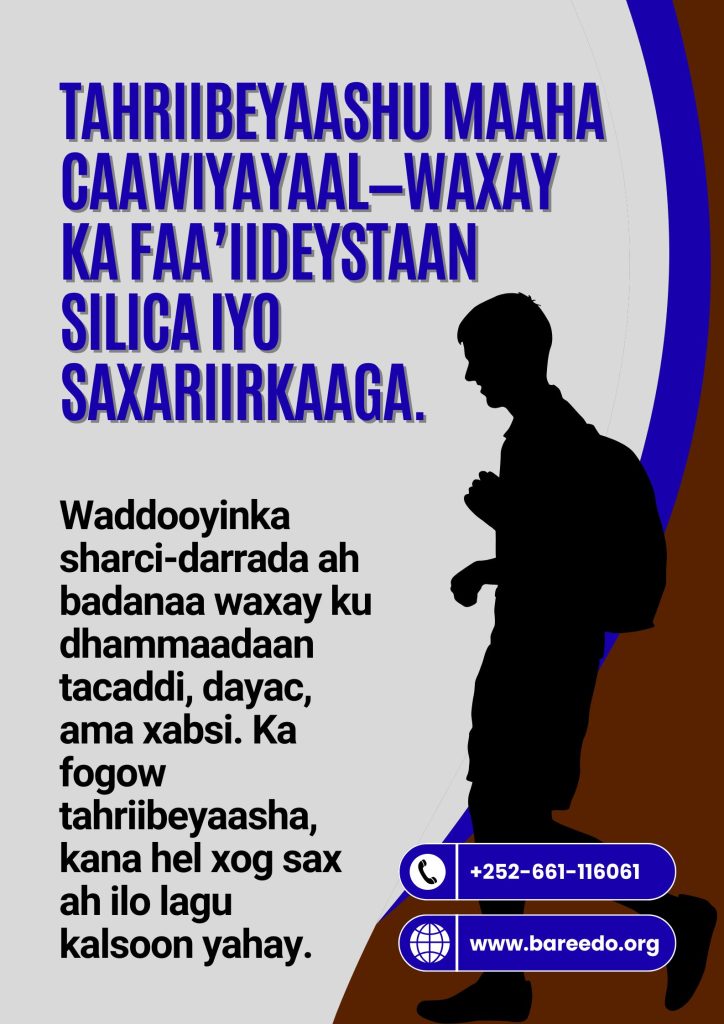
SOMALI
“Tahriibeyaashu Maaha Caawiyayaal—Waxay Ka Faa’iideystaan Silica Iyo Saxariirkaaga.”
Waddooyinka sharci-darrada ah badanaa waxay ku dhammaadaan tacaddi, dayac, ama xabsi. Ka fogow tahriibeyaasha, kana hel xog sax ah ilo lagu kalsoon yahay.
Message 3
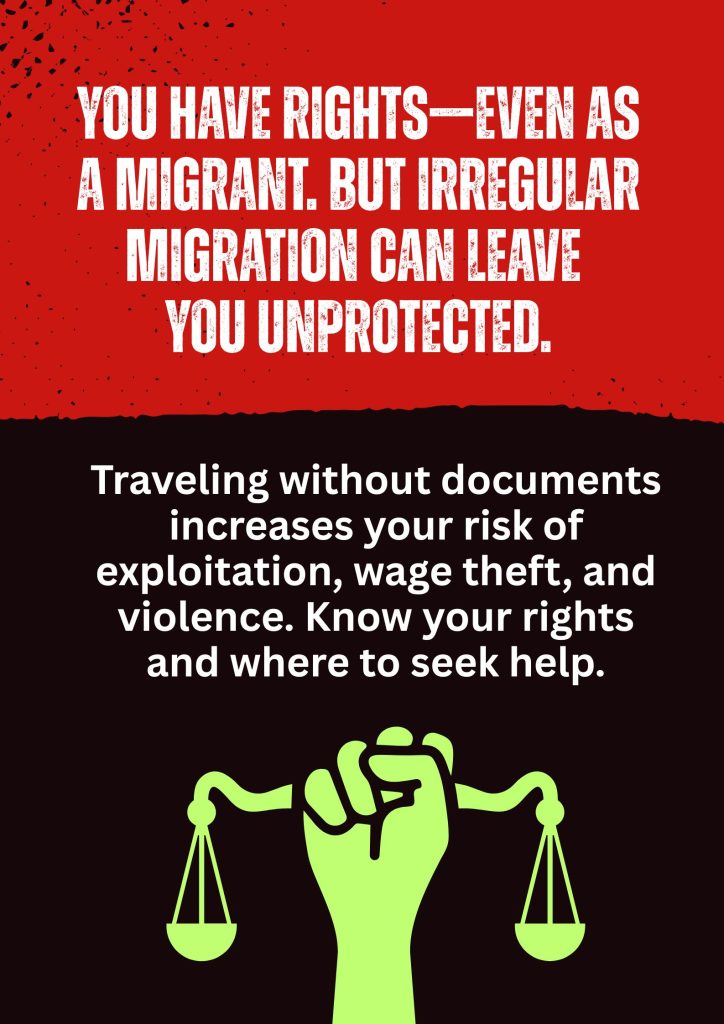
ENGLISH
“You Have Rights—Even as a Migrant. But Irregular Migration Can Leave You Unprotected.”
Traveling without documents increases your risk of exploitation, wage theft, and violence. Know your rights and where to seek help.
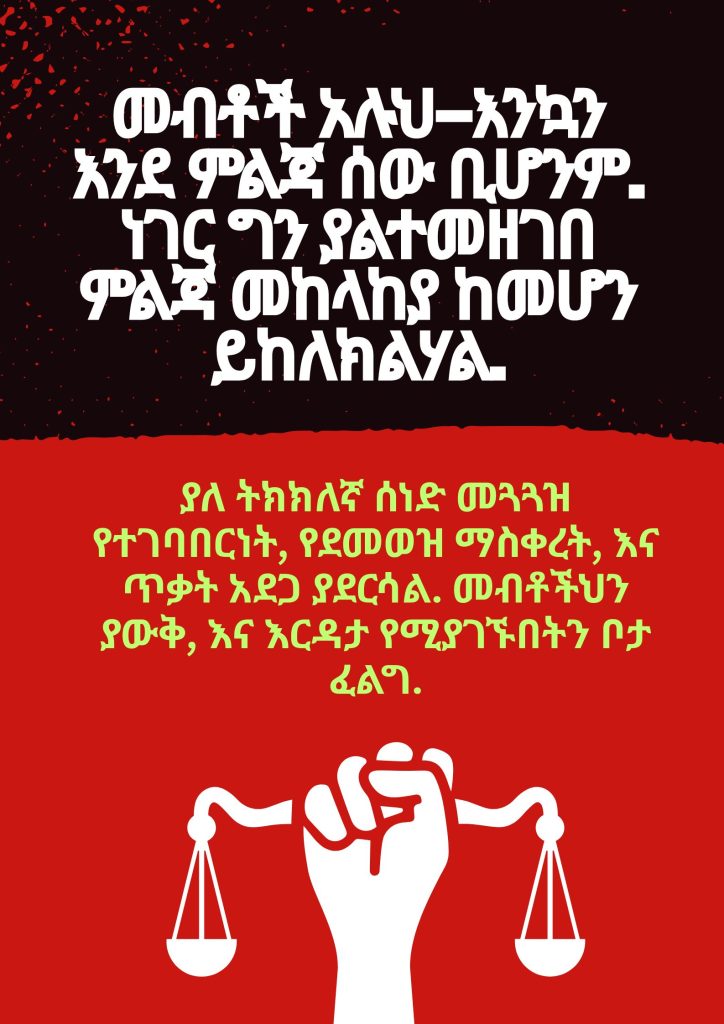
AMHARIC
“መብቶች አሉህ—እንኳን እንደ ምልጃ ሰው ቢሆንም. ነገር ግን ያልተመዘገበ ምልጃ መከላከያ ከመሆን ይከለክልሃል.”
ያለ ትክክለኛ ሰነድ መጓጓዝ የተገባበርነት, የደመወዝ ማስቀረት, እና ጥቃት አደጋ ያደርሳል. መብቶችህን ያውቅ፣ እና እርዳታ የሚያገኙበትን ቦታ ፈልግ.
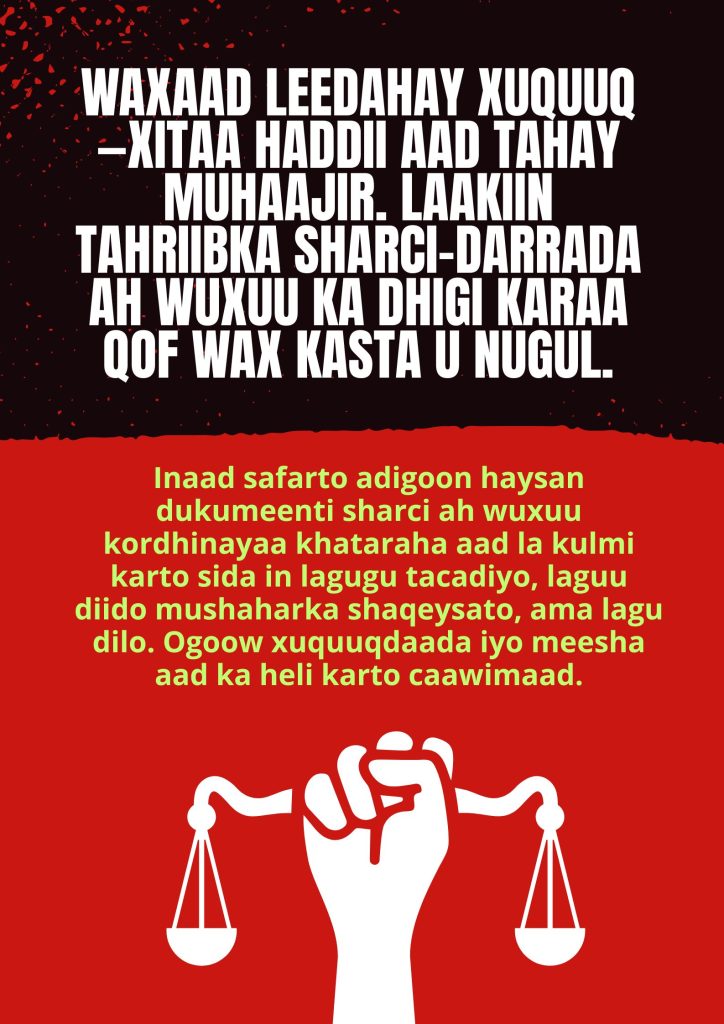
SOMALI
“Waxaad Leedahay Xuquuq—Xitaa Haddii Aad Tahay Muhaajir. Laakiin Tahriibka Sharci-Darrada Ah Wuxuu Ka Dhigi Karaa Qof Wax Kasta U Nugul.”
Inaad safarto adigoon haysan dukumeenti sharci ah wuxuu kordhinayaa khataraha aad la kulmi karto sida in lagugu tacadiyo, laguu diido mushaharka shaqeysato, ama lagu dilo. Ogoow xuquuqdaada iyo meesha aad ka heli karto caawimaad.
Message 4
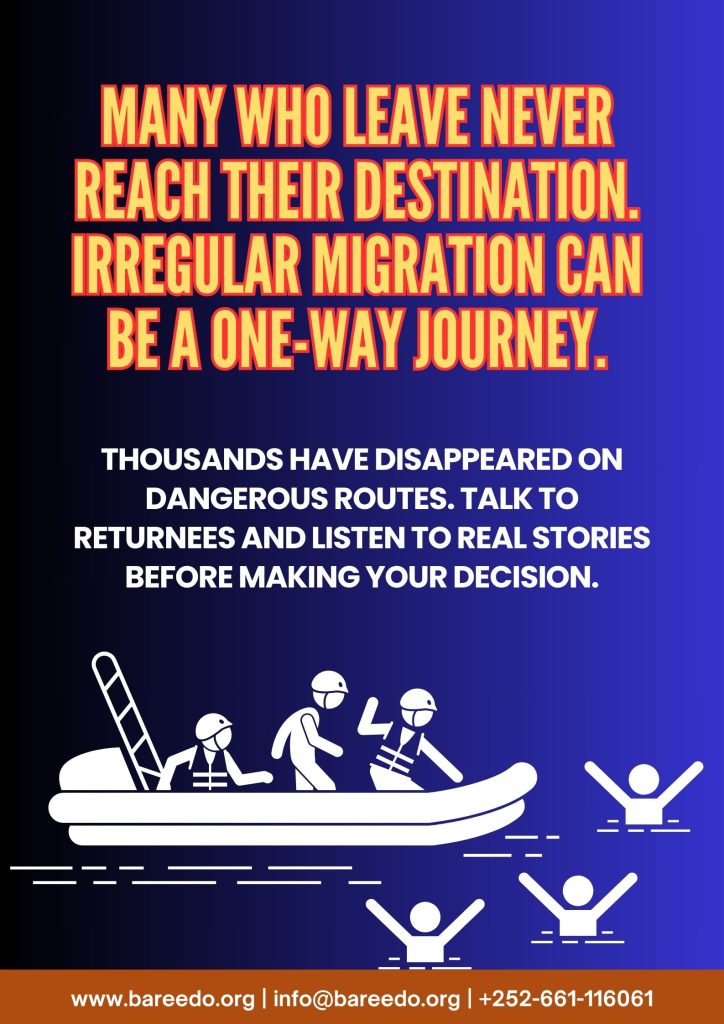
ENGLISH
“Many Who Leave Never Reach Their Destination. Irregular Migration Can Be a One-Way Journey.”
Thousands have disappeared on dangerous routes. Talk to returnees and listen to real stories before making your decision.
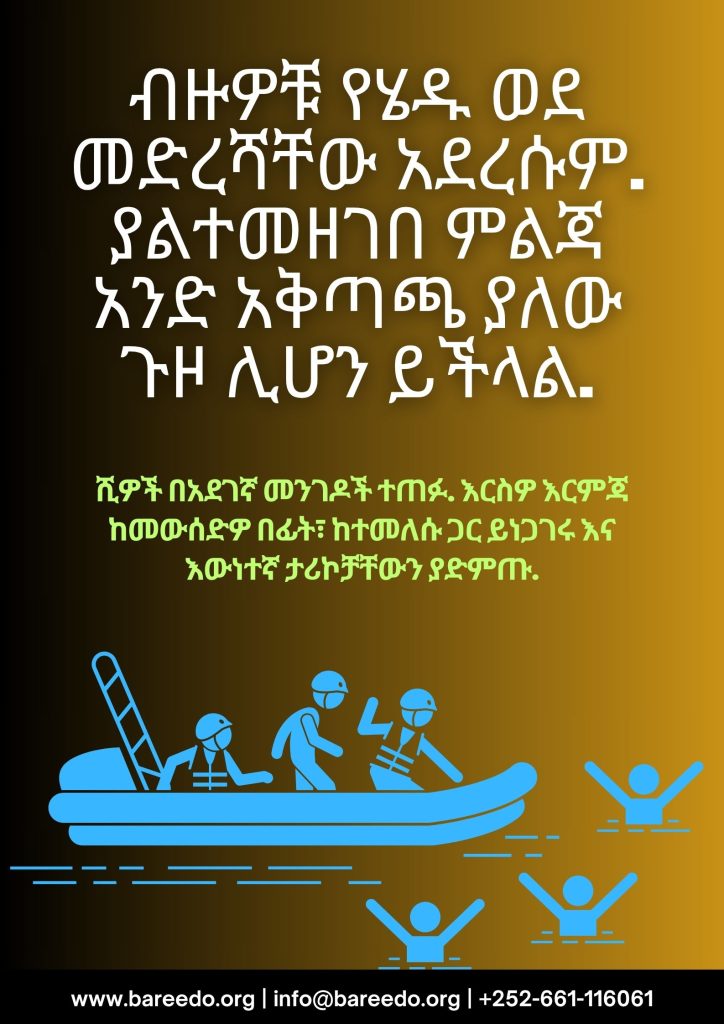
AMHARIC
“ብዙዎቹ የሄዱ ወደ መድረሻቸው አደረሱም. ያልተመዘገበ ምልጃ አንድ አቅጣጫ ያለው ጉዞ ሊሆን ይችላል.”
ሺዎች በአደገኛ መንገዶች ተጠፉ. እርስዎ እርምጃ ከመውሰድዎ በፊት, ከተመለሱ ጋር ይነጋገሩ እና እውነተኛ ታሪኮቻቸውን ያድምጡ.
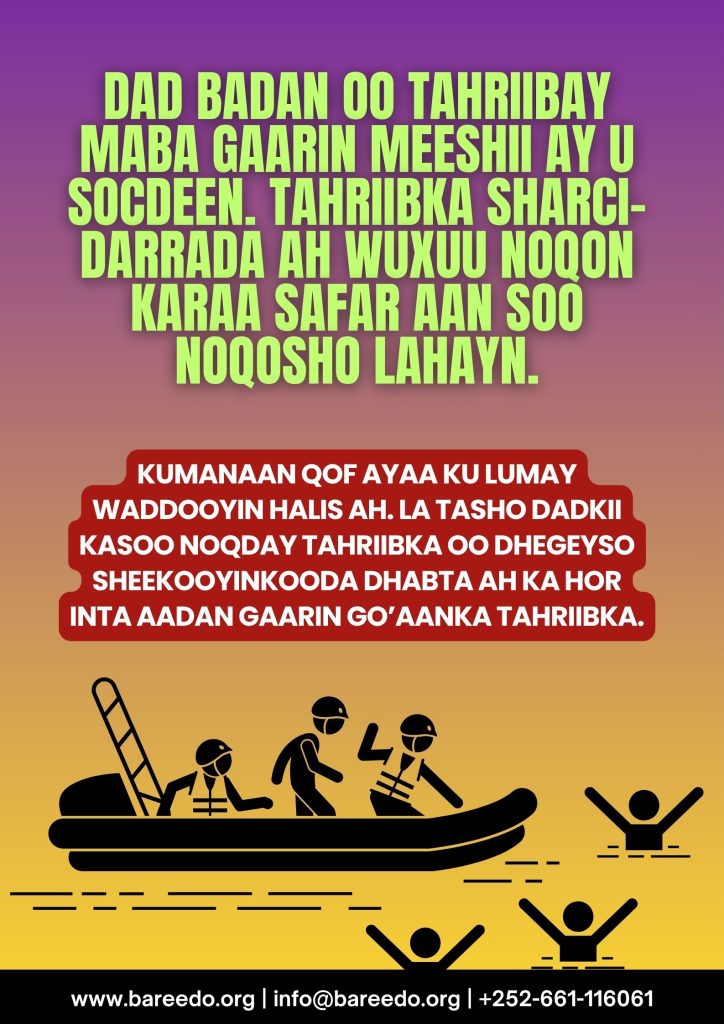
SOMALI
“Dad Badan Oo Tahriibay Maba Gaarin Meeshii Ay U Socdeen. Tahriibka Sharci-Darrada Ah Wuxuu Noqon Karaa Safar Aan Soo Noqosho Lahayn.”
Kumanaan qof ayaa ku lumay waddooyin halis ah. La tasho dadkii kasoo noqday tahriibka oo dhegeyso sheekooyinkooda dhabta ah ka hor inta aadan gaarin go’aanka tahriibka.
Message 5
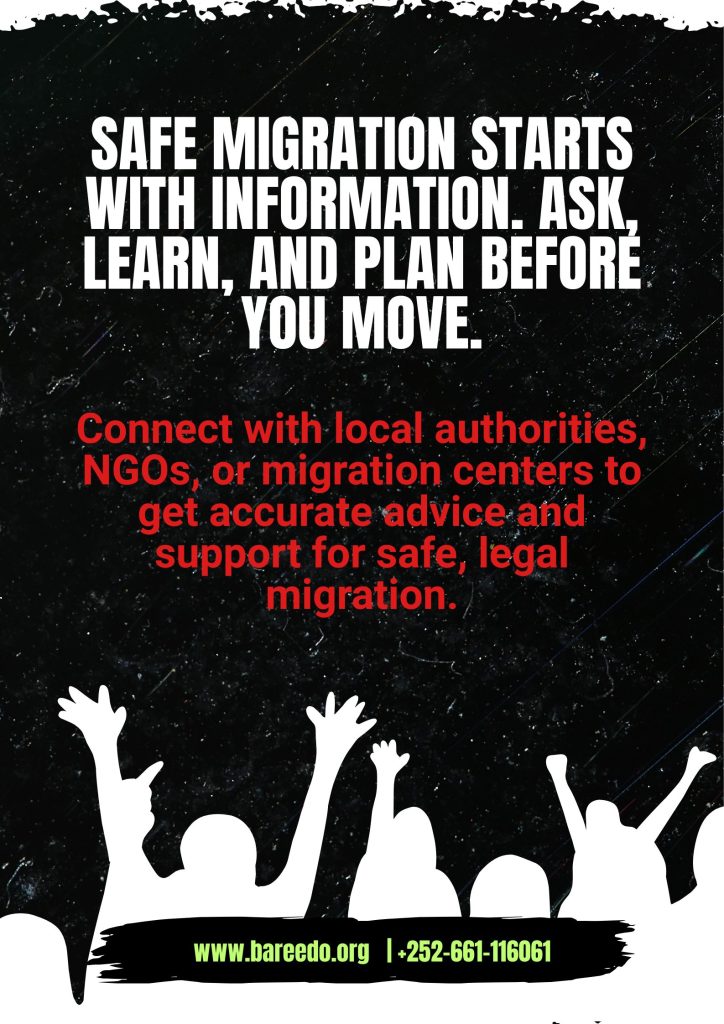
ENGLISH
“Safe Migration Starts with Information. Ask, Learn, and Plan Before You Move.”
Connect with local authorities, NGOs, or migration centers to get accurate advice and support for safe, legal migration.
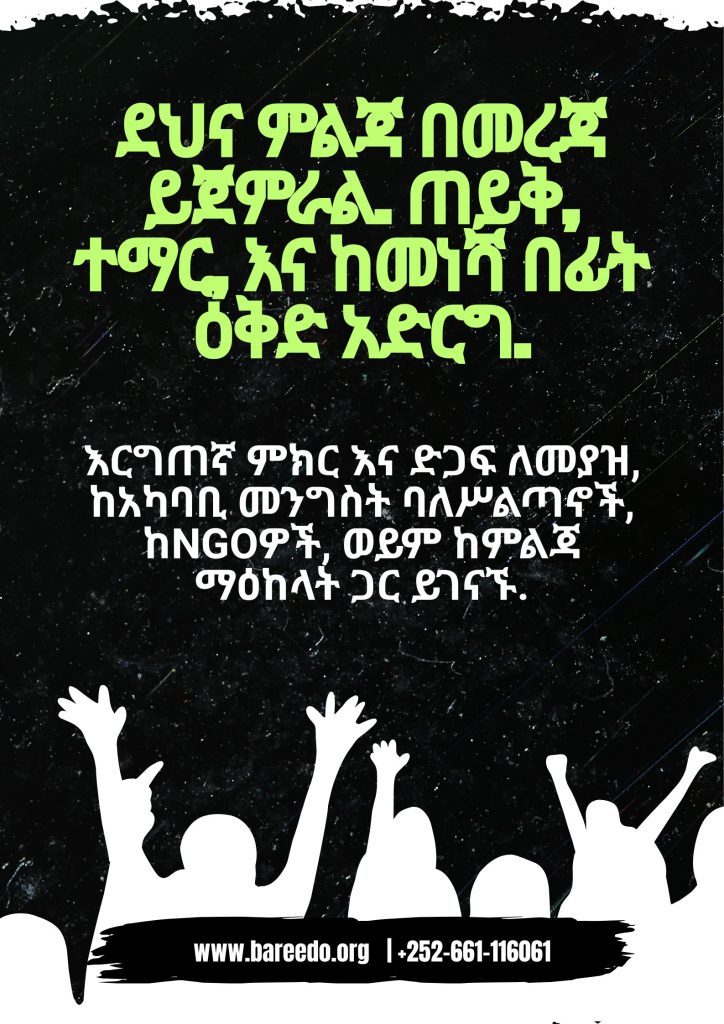
AMHARIC
“ደህና ምልጃ በመረጃ ይጀምራል. ጠይቅ, ተማር, እና ከመነሻ በፊት ዕቅድ አድርግ.”
እርግጠኛ ምክር እና ድጋፍ ለመያዝ, ከአካባቢ መንግስት ባለሥልጣኖች, ከNGOዎች, ወይም ከምልጃ ማዕከላት ጋር ይገናኙ.
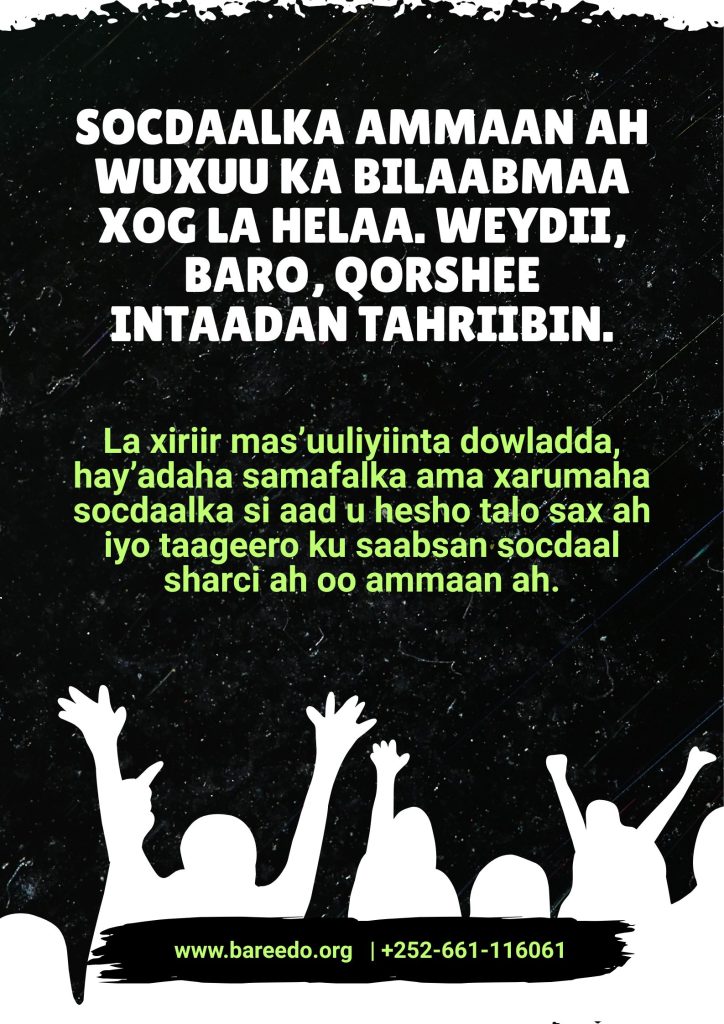
SOMALI
“Socdaalka Ammaan ah Wuxuu Ka Bilaabmaa Xog La Helaa. Weydii, Baro, Qorshee Intaadan Tahriibin.”
La xiriir mas’uuliyiinta dowladda, hay’adaha samafalka ama xarumaha socdaalka si aad u hesho talo sax ah iyo taageero ku saabsan socdaal sharci ah oo ammaan ah.
For more information or customized materials, please contact:
Email: info@bareedo.org or Tell: +252-661-116061

